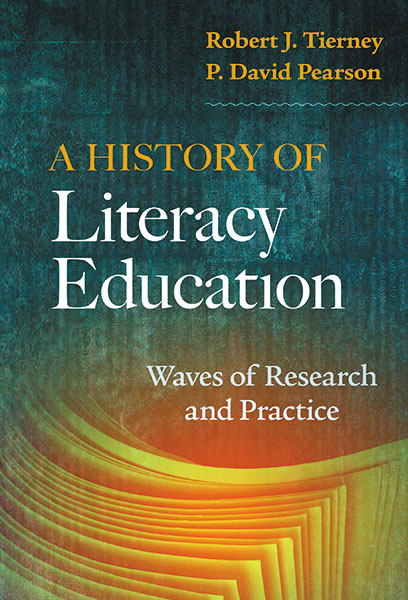Professors: Request an Exam Copy
Print copies available for US orders only. For orders outside the US, see our international distributors.
Robert J. Tierney, P. David Pearson
Publication Date: June 18, 2021
Pages: 400

In this volume, two notable scholars trace the monumental shifts in theory, research, and practice related to reading education and literacy, with particular attention to what they consider the central goal of literacy—making meaning. Each section describes a specific epoch, including a brief snapshot of how the reader of that period is envisioned and characterized by researchers and teachers, as well as a deep discussion of the ideas and contextual events of that era. These developmental waves are organized in rough historical sequence by a series of shifts in underlying theoretical and scholarly lenses—from the behavioral to the psycholinguistic to the cognitive to the sociocultural to the critical to the multimodal to the global. The book closes with a discussion of the various research frames and methodological approaches that paralleled these developments. The common thread across all the chapters is making meaning. For each wave, the authors unearth and interrogate the assumptions about making meaning with text as well as the practices to promote it—whether the meaning making is inspired by print, image, sound, or some multimodal mash-up. This unique resource is a must-own for every literacy professor and graduate scholar.
Book Features:
Robert J. Tierney is emeritus dean and emeritus professor of the Faculty of Education at the University of British Columbia, past dean of the Faculty of Education and Social Work at the University of Sydney, and a visiting distinguished scholar at Beijing Normal University. P. David Pearson is the Evelyn Lois Corey Emeritus Professor of Instructional Science in the Graduate School of Education at the University of California, Berkeley.
“Robert J. Tierney and P. David Pearson’s A History of Literacy Education: Waves of Research and Practice is both accessible and elegant—a necessity for moving forward while recalling the best of the past.”
—Donna E. Alvermann, The Omer Clyde and Elizabeth Parr Aderhold Professor in Education and Distinguished Research Professor, University of Georgia
“This is a powerful and groundbreaking contribution to a field that has all too often ignored its own histories and cultures. Rob Tierney and David Pearson provide a rich historical narrative of research and theory set against a broader backdrop of a century of cultural and disciplinary social and political change. It is a living history filled with critical insights and observations from their continuing journeys as scholars and global educators.”
—Allan Luke, emeritus professor, Queensland University of Technology, Australia
“In this book, Robert J. Tierney and P. David Pearson have taken on the unique role of cultural guides to a complex series of theoretical, social, and political movements that have shaped the understandings of reading/literacy relationships over the past five decades. Through a unique approach to (re)constructing the histories of different theoretical perspectives, they introduce readers to the shifting sands of research, which they frame as waves, that have shaped present as well as past understandings of what counts as reading/literacy processes as well as ‘readers’ within these perspectives. As cultural guides, Tierney and Pearson introduce readers to the contributions of diverse groups of scholars as a foundation for readers to understand how their personal dialogues and journeys with researchers from differing perspectives led to new insights and understandings of reading/literacy relationships and their influence in local contexts of education.”
—Judith Green, professor emerita, University of California, Santa Barbara
Contents (Tentative)
Introduction: An Overview
Part I: Looking back
1. Beginning Traces: Early Science and Cultural Concerns
Enculturated Reader
Foundational Years of Reading
2. Early Method
Assembled Reader
Search for Best Method
Part II: Waves of development
3. The Cognitive Wave
Constructivist Reader
The Cognitive Turn
4. The Learning to Learn Wave
Strategic Reader
Learning to Learn
5. The Reading-Writing Wave
Writerly Reader
Reading-Writing Relationships
6. The Social Wave
Social Readers
Social Wave
7. The Critical Wave
Critical Advocate
Critical Literacies
8. The Assessment Wave Wave
Self-Assessor Reader
Wave of New Assessment Paradigms
9. The Reform Wave
Regulated Reader
The Era of Reform
10. The Digital Wave
Digital Reader
Digital Wave
11. The Global Wave
Global Meaning Maker
Globalization
Part III: Ebb, Flow, and Overlap
12. Research Currents
History Unaccounted: A Personal Retrospective on Waves of Development
Index
About the Authors
Professors: Request an Exam Copy
Print copies available for US orders only. For orders outside the US, see our international distributors.